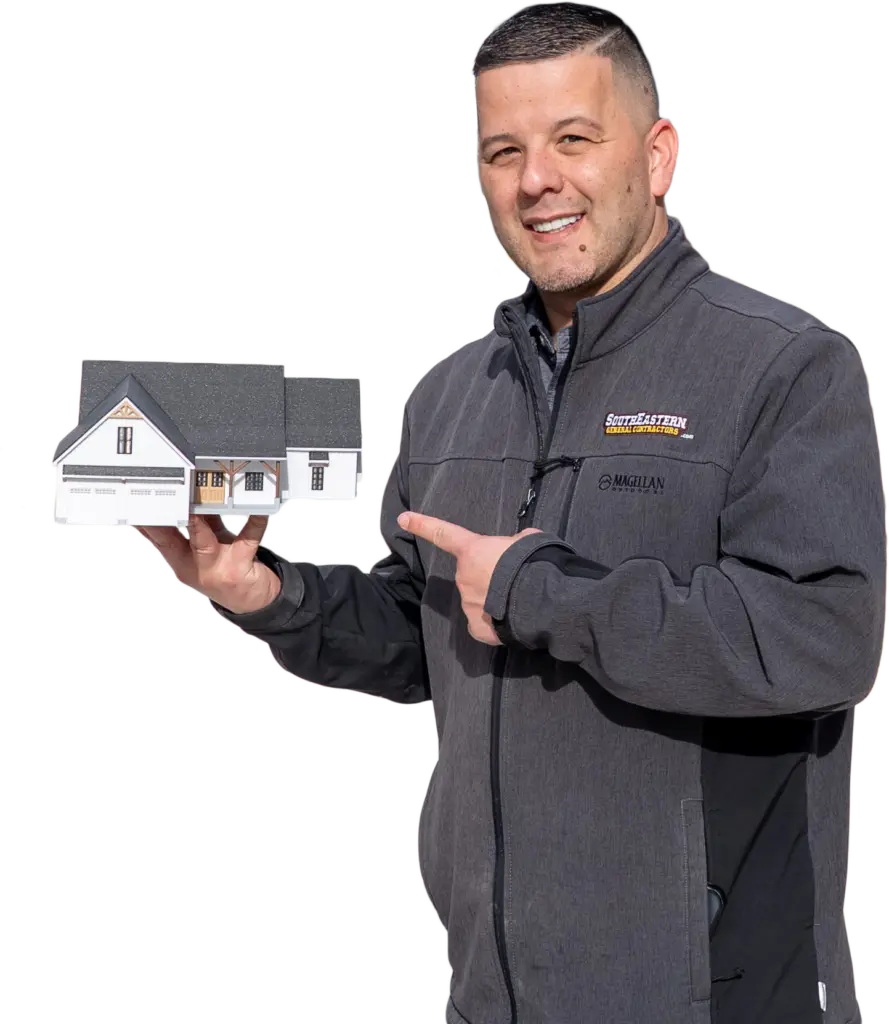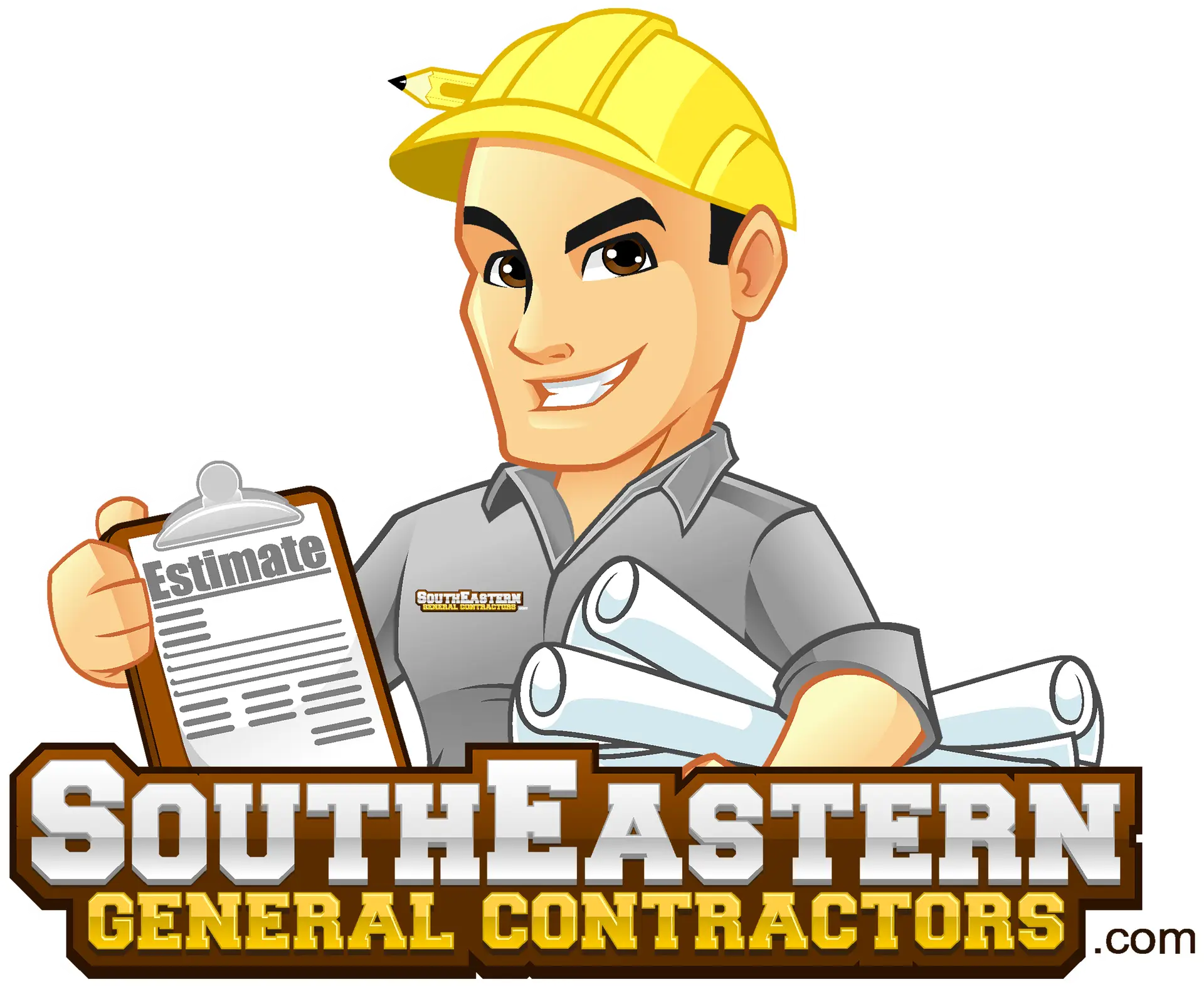
Cost of Building a House North Carolina: An Expert Guide
So, you're dreaming of building your own home in the beautiful Tar Heel State, but that big question looms: "What's this actually going to cost me?" Let's get right to it. The average cost to build a house in North Carolina falls somewhere between $100 and $200 per square foot.
That’s a pretty wide range, right? For a standard 2,000-square-foot home, you're looking at a construction budget of $200,000 to $400,000. And remember, that’s before you even buy the plot of land it’s going on.
Your Quick Guide to North Carolina Home Building Costs
Building a custom home is one of the biggest, most personal investments you'll ever make. It's not just about lumber and nails; it's about creating a place where your family's story will unfold. Getting a firm grip on the numbers is the very first step in making that dream a reality. As a locally-rooted, Native American-owned firm with over 21+ years of proven results, we believe in starting every project with clear, honest information. No surprises.
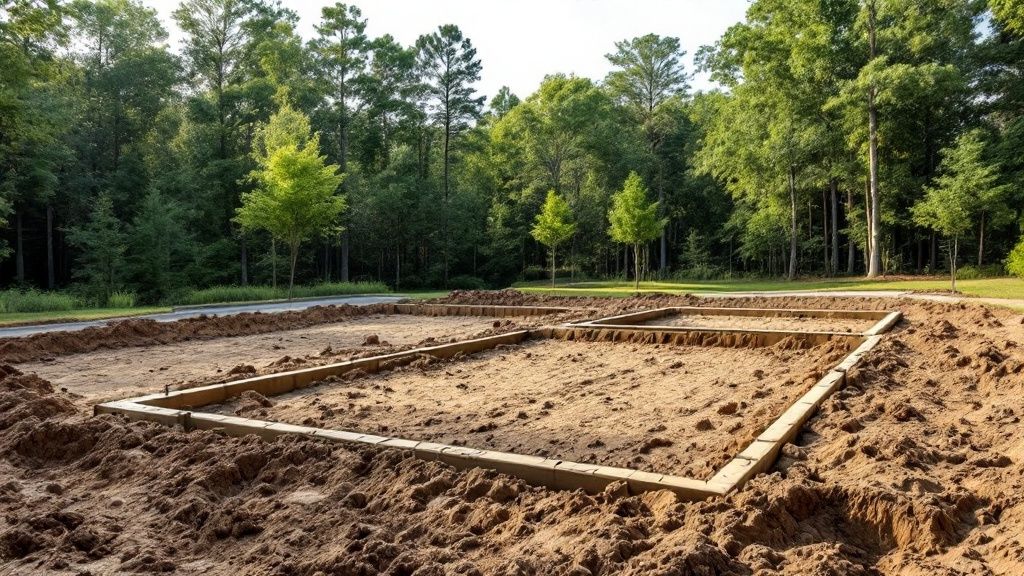
Think of this guide as your financial cheat sheet—an actionable foundation of knowledge to help you plan with confidence. We’re going to pull back the curtain on the key factors that drive the final price tag, from the Blue Ridge Mountains to the Outer Banks.
Understanding the Core Numbers
Here's the thing: there's no single, magic number for building a house in North Carolina. The final cost is a cocktail of variables—your location, how complex the design is, and the quality of the materials you pick are the big three.
As we head into 2025, specific phases of construction have their own price tags. For instance, just getting the foundation poured can run anywhere from $4,039 to $14,848. Putting up the bones of the house—the framing—typically ranges from $1,408 to $7,670. If you want to dive deeper, you can explore more about these construction phase costs to get a really granular view of the budget.
At Southeastern General Contractors, we've spent decades helping families in communities like Fayetteville and Lumberton make sense of these numbers. Our Native American-owned leadership and 8(a) certification aren't just badges; they represent a deep commitment to our community. We’ve learned that building trust is just as important as building the house itself, and that always starts with being upfront about the budget.
A Snapshot of Construction Expenses
To help you see where the money goes, we've put together a high-level overview of the major construction phases. This table gives you a basic framework for how the different parts of the build contribute to the total investment.
Estimated Cost Breakdown for a 2000 sq ft Home in NC
This table provides a high-level overview of estimated costs for major construction phases, helping you visualize where your budget goes.
| Construction Phase | Average Cost Range |
|---|---|
| Site Work & Foundation | $15,000 – $40,000 |
| Framing & Exterior | $40,000 – $80,000 |
| Major Systems (HVAC, Electrical, Plumbing) | $30,000 – $60,000 |
| Interior Finishes (Drywall, Flooring, Paint) | $50,000 – $100,000+ |
| Final Touches (Fixtures, Landscaping) | $15,000 – $50,000 |
Disclaimer: These figures are estimates for a standard 2,000 sq ft home and can vary widely.
This breakdown is your starting point. As a HUBZone and 8(a) certified contractor, we have a deep understanding of how to source materials and manage labor efficiently, which means our clients get exceptional value for their investment. Our mission is to walk you through every line item, helping you make smart decisions that bring your dream home to life without breaking the bank. It's about building legacies, not just structures.
Breaking Down Your Construction Budget: The Big Four
That "cost per square foot" number everyone talks about? It's a great starting point, but it's just the tip of the iceberg. To really get a handle on what it costs to build a house in North Carolina, you have to look at what’s holding that number up. We call them the four pillars of your construction budget.
Think of it this way: you can't just buy a "car" for one price. Is it a basic sedan or a luxury SUV? The final cost depends on the engine, the trim, the tech inside… you get the idea. It's the same with a house.
Each pillar—the land itself, the materials you choose, the skilled hands building it, and all the official paperwork—is a major part of the final sticker price. As an 8(a) certified and Native American-owned firm, we at SEGC have spent more than two decades helping clients balance these pillars. We know where you can save and where you absolutely shouldn't skimp.
This image gives you a bird's-eye view of how all the pieces, from the dirt work you'll never see again to the fancy finishes you'll touch every day, come together.
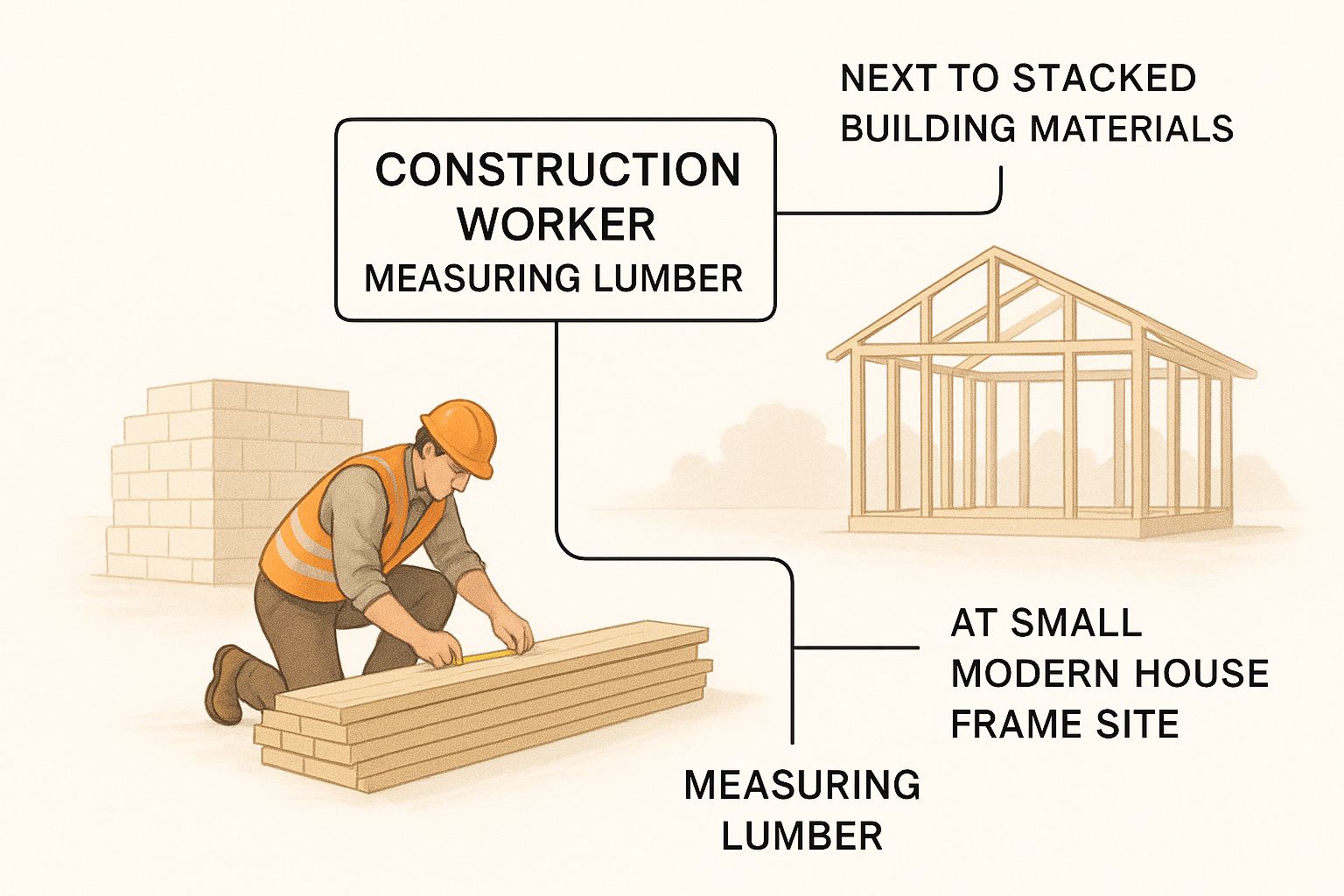
It really shows that the visible stuff is just one part of a much bigger financial puzzle.
Pillar 1: Land and Site Prep
Before a single 2×4 goes up, you need a stage to build on. This is your plot of land, and the cost here can sneak up on you if you're not careful. The average price for an acre in North Carolina might be around $33,793, but that's just to own the dirt. Getting it ready to build on is a whole other ballgame.
This "site prep" phase is where the heavy lifting starts, and it involves a few key steps:
- Land Surveying: You need to know exactly where your property lines are. This typically runs between $376 and $768.
- Clearing and Grading: Got a lot full of trees, boulders, and hills? They've got to go. Clearing the land and then leveling it for a solid foundation can cost anywhere from $1,500 to well over $10,000, depending on how wild the terrain is.
- Utility Hookups: Bringing water, sewer, power, and gas to your site can add thousands to the bill, especially if you're building out in a more rural spot.
Don't underestimate this part. An actionable insight from our 21+ years of experience: solid site prep is the foundation for your foundation. Cutting corners here is a recipe for disaster down the road.
Pillar 2: Building Materials
Alright, now for the fun stuff—the materials that will actually become your home. This is the biggest chunk of your budget, usually eating up about 50% of the total construction cost.
Every single choice matters here, from the lumber that frames the walls to the style of faucet in the guest bath. A standard asphalt shingle roof might cost $4.50 per square foot, but if you want a sleek, long-lasting metal roof, you’re looking at something closer to $15 per square foot. The same story plays out with siding, flooring, windows, and countertops.
We’ve spent years building solid relationships with suppliers throughout the Fayetteville and Lumberton areas. It’s a huge advantage because it means we can get top-notch materials at fair prices, making sure our clients’ money goes into quality that lasts. This local leadership is a core part of the trust and value we deliver.
Pillar 3: Skilled Labor
If materials are the car parts, labor is the team of master mechanics who assemble them flawlessly. Your labor costs cover the expertise of everyone from the general contractor orchestrating the whole project to the electricians, plumbers, and framers on the ground. This slice of the pie is usually about 30% to 40% of your total budget.
Labor rates in North Carolina are pretty reasonable, but they do change based on the trade and where you're building. An electrician might charge around $25.70 per hour, while a highly skilled mason doing custom stonework will command more. Your general contractor is the quarterback, and a good one is worth their weight in gold for keeping the project moving smoothly and on budget.
This is where experience really pays off. A pro knows how to anticipate problems before they become expensive headaches. If you want to see how the pros avoid costly mistakes, learning about managing risk in project management is a great place to start.
Pillar 4: Permits and Fees
Last but not least, we have the paperwork. Permits and fees are the non-negotiable costs of doing business with the local government. It's the price of ensuring your home is built to be safe, secure, and up to North Carolina's building codes.
These costs can change quite a bit depending on your county or city, but they generally include:
- Building Permits: These can range anywhere from $525 to $3,041.
- Impact Fees: This is money paid to the local government to help offset the "impact" your new home has on public services like schools, parks, and roads.
- Inspection Fees: Throughout the build, an inspector has to come out and sign off on critical stages like the foundation, framing, and electrical. Each of those visits has a fee.
It's not the most glamorous part of the process, but it's absolutely essential. An actionable insight: have your builder handle the entire permitting process. Our team’s deep familiarity with local Fayetteville and Lumberton regulations prevents the delays that can plague less experienced builders.
How Your Location Shapes the Final Price Tag
When you start crunching the numbers for a new home in North Carolina, you’re probably thinking about lumber, countertops, and labor. But here’s a little secret from the pros: one of the biggest line items on your budget is determined by something you can't see on a blueprint—the ground you build on.
The Tar Heel State’s geography is a wild ride, and building a dream home in the misty Blue Ridge Mountains is a completely different ballgame than setting foundations along the sandy Outer Banks.
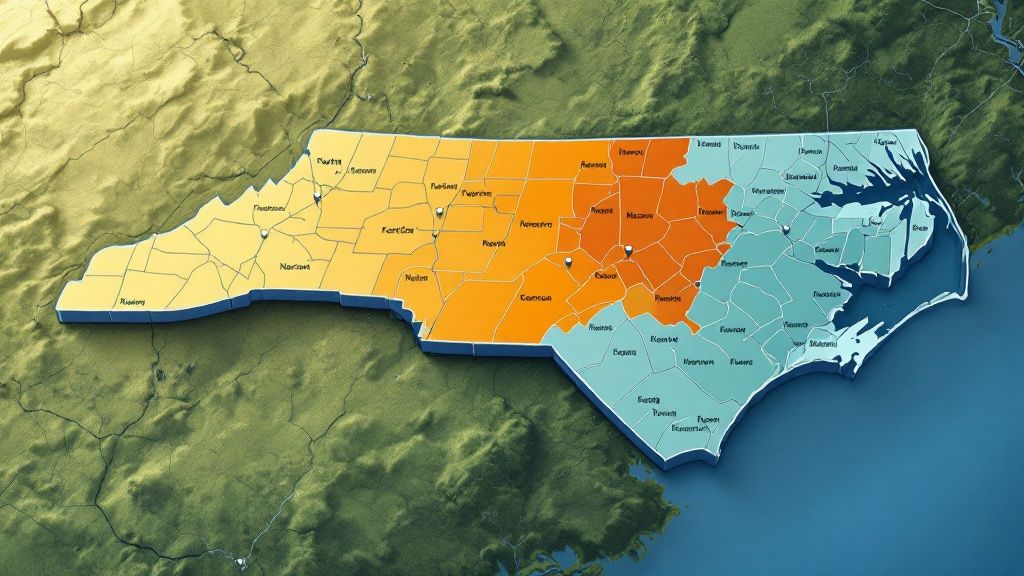
Think of it like this: the house plan is the base model of a car. Your location is the options package. Building in the mountains? You’ll need the all-terrain package. Building on the coast? Better get the hurricane-proof, rust-resistant upgrade. Each one changes the final sticker price.
The Mountain Region Challenge
Let's head west, to the stunning landscapes around Asheville and Boone. Those jaw-dropping views come with some equally eye-popping site preparation costs.
Finding a perfectly flat, ready-to-build lot here is like finding a unicorn. Most of the time, you’re working with a slope, which means a simple slab foundation is off the table. Instead, you're looking at some serious engineering to keep your home from sliding down the mountain.
- Foundation Work: Building on a grade means you'll likely need costly retaining walls, deep footers, or a walk-out basement design. These aren't just features; they're necessities that add thousands to your budget.
- Accessibility: Ever tried to get a concrete truck up a winding, single-lane mountain road? It’s a logistical nightmare that adds a premium to both labor and delivery fees.
- Excavation: The ground isn't just sloped; it can be full of rock. That means blasting or heavy-duty excavation, which is a far cry from digging in the soft soil you’ll find elsewhere in the state.
The Coastal Plain Considerations
Now, let's drive east to the coast. Building near Wilmington or out on the Outer Banks means you're squaring up against Mother Nature herself. Those incredible ocean views come with the non-negotiable responsibility of building a fortress that can shrug off hurricanes and coastal flooding.
This isn’t about preference; it’s all baked right into the local building codes.
With over 21+ years of proven results, we've learned to have a deep respect for the local environment. Our entire philosophy is about building smart from the ground up, so your home isn’t just beautiful—it's a resilient family legacy built to last for generations. Our commitment to quality is how we build client trust every single day.
Here's what drives costs up on the coast:
- Elevated Foundations: To stay above the flood plain, most coastal homes need to be perched on stilts or pilings. It’s a massive structural expense right from the start.
- Impact-Resistant Materials: We’re talking hurricane-rated windows, reinforced garage doors, and specialized roof strapping designed to keep your roof attached in 100+ mph winds. This high-performance gear comes at a premium.
- Material Sourcing: In the more remote spots along the coast, just getting materials and skilled tradespeople to your job site can be a logistical headache that costs you more.
The Piedmont Plateau: The Middle Ground
The central Piedmont region, which includes bustling cities like Raleigh, Charlotte, and our home turf of Fayetteville, is often the "just right" porridge of building costs. The terrain is generally flatter and the soil more predictable, which really simplifies the whole site prep and foundation process.
But "average" doesn't mean easy. Labor and material costs can skyrocket in the booming metro areas compared to the quieter, rural corners of the region.
Here's where having a builder with deep local roots becomes your secret weapon. On a recent project right here in Fayetteville, we ran into some unexpected soil compaction issues after clearing the lot. Because we’ve been working with the same local engineers and excavation crews for years, we made one phone call. We had the right team on-site to fix the soil without torching the schedule or the budget. What could have been a crisis became a minor course correction—a testament to the power of our local leadership and expertise.
For folks looking to build on land they already own, understanding these local quirks is everything. You can explore more about our process for building on your lot, which we’ve fine-tuned to handle the unique challenges of every North Carolina region.
Regional Building Cost Comparison in North Carolina
To really see how geography impacts your wallet, let's break down the key differences side-by-side. This table shows where your money goes depending on whether you're building up high, down low, or in the middle.
| Cost Factor | Mountain Region | Piedmont Region | Coastal Region |
|---|---|---|---|
| Site Prep | High (extensive excavation, grading) | Low to Moderate (flatter terrain) | Moderate (clearing, soil stabilization) |
| Foundation | Very High (sloped lots, retaining walls) | Low (standard slab or crawlspace) | Very High (pilings, elevated structures) |
| Labor Costs | Moderate to High (specialized skills) | Varies (higher in metro areas) | High (demand for skilled trades) |
| Material Costs | High (delivery challenges) | Moderate (good access to suppliers) | High (specialty/resilient materials) |
| Permits | Complex (environmental regulations) | Standard (varies by municipality) | Very Complex (flood zones, CAMA) |
As you can see, the "same" house can have a wildly different final cost depending on where you plant your flag. Understanding these regional drivers from the get-go is the first step toward building a realistic and accurate budget.
So, Why Is Everyone Building a House in North Carolina?
Let's be honest, you've noticed it too, haven't you? It feels like every other car on the highway has an out-of-state plate, and new construction sites are popping up everywhere. From the booming tech scene in the Research Triangle to the quiet beauty of the Blue Ridge Mountains, the Tar Heel State is having a major moment.
This isn't just a fleeting trend. This incredible growth is the very engine cranking up the demand for new homes, and it's directly tied to the cost of building a house in North Carolina. Understanding why this is happening is the first step to smartly planning your own build.
A Perfect Storm of Jobs and Lifestyle
So, what's the big secret? It’s a powerful mix: a red-hot economy, jaw-droppingly beautiful landscapes, and a quality of life that’s tough to find anywhere else. People aren't just moving here for a job; they're coming for a whole new way of living. You can spend your weekend hiking a mountain trail and your weekday in a bustling city, all without leaving the state.
This magnetic pull has kicked off an unbelievable housing boom. The numbers are staggering. Between April 1, 2020, and July 1, 2024, North Carolina packed on 365,000 new housing units. That's a massive 7.7% jump, making us the fifth-fastest-growing state for housing in the entire country. If you want to see the full picture, you can discover more about North Carolina’s residential growth.
The real fireworks are happening in places like Wake and Mecklenburg counties, the epicenters of our economic explosion. Wake County alone added 66,000 homes in that same timeframe—the sixth-highest number for any county in the U.S. All this competition for space naturally drives up land prices, stretches material supply chains thin, and makes skilled labor a hot commodity.
More Than Just Houses—We're Building Legacies
As a Native American-owned and HUBZone-certified firm, we at SEGC aren't just watching this from the sidelines; we're right in the thick of it. For over 21 years, our team has been part of the very soul of communities like Fayetteville and Lumberton. We've had a front-row seat to this incredible transformation.
We get it. Building a home here isn't just about lumber and drywall. It’s about planting roots in a place that’s buzzing with energy and creating a future for your family.
Our mission is simple: to guide families through this booming market with a steady hand. We tap into our deep local knowledge and track record to create a building experience built on trust, quality, and a genuine desire to see our communities flourish. This is how we build legacies, not just structures.
Our work in places like Fayetteville and Lumberton is personal. We're not just contractors; we're neighbors. We've seen firsthand how a well-built home or a thoughtful community project can breathe new life into a neighborhood and create opportunities for everyone.
Thanks to our local leadership and 8(a) certification, we're able to take on projects that support both families and the public infrastructure that makes these communities so desirable in the first place. We believe in building smart, creating homes and spaces that ensure North Carolina remains an amazing place to live for generations.
Budgeting Like a Pro: Insider Tips from a Builder You Can Trust
Let’s be honest: building a custom home is about more than just a beautiful design and top-notch materials. The real secret to a successful project? A rock-solid budget. Think of it as the financial foundation for your entire build. Without one, even the most stunning blueprint can become a source of major stress.
With over 21 years in the trenches, we've learned a thing or two about managing the money side of things. We're here to pull back the curtain and share some actionable insights so you can navigate your finances like a seasoned pro. This isn't just about crunching numbers; it's about building a financial roadmap that lets you create a home that’s both your personal sanctuary and a smart investment for the future.
Building Your Financial Foundation
Before you get lost in floor plans and paint swatches, your first move is to get your financing in order. Most custom home projects get off the ground with a construction loan—a short-term loan that covers the building costs and then converts into a regular mortgage once the dust settles.
To get that loan, your lender is going to want to see a detailed project estimate. This is where having a builder you trust from day one becomes your biggest advantage.
Getting a handle on the numbers is key. In 2025, the average cost to build a 2,000-square-foot house in North Carolina hovers around $282,000. But that number can swing wildly based on the materials you choose and how complex your design is. With things like a sudden 50% surge in steel prices popping up, a firm grip on your budget is non-negotiable. It's worth it to explore more 2025 construction cost factors to see how these market trends can play out.
Another crucial piece of the puzzle is your contingency fund. This isn't an "if" fund; it's a "when" fund. Plan on setting aside 10-15% of your total construction cost for the curveballs. Maybe we discover tricky soil during excavation, or a key material suddenly gets more expensive. This fund is your safety net, stopping a small hiccup from turning into a full-blown financial crisis.
Choosing Your Contract: Fixed-Price vs. Cost-Plus
When you partner with a builder, you'll run into two main types of contracts. The one you pick has a huge say in how your budget is managed.
- Fixed-Price Contract: This is exactly what it sounds like. The builder agrees to build your home for one single, locked-in price. It's fantastic for predictability and for anyone who needs to stick to a very specific budget. No surprises.
- Cost-Plus Contract: With this model, you pay the actual cost of the labor and materials, plus a pre-agreed fee or percentage for the builder's overhead and profit. It's more transparent and flexible, making it easier to make changes as you go.
There's no magic "right" answer here. The best choice really boils down to your personal comfort with risk and what you want to achieve with the project. We always take the time to walk our clients through the pros and cons of each, making sure the contract feels right for their financial situation. Adopting good contract management best practices is also a must for keeping everything—and everyone—on the same page from start to finish.
At SEGC, our entire process is built on transparency. Whether you're in Fayetteville, Lumberton, or anywhere in between, you deserve to know exactly where every dollar is going. That's how we build the trust that turns a client-builder relationship into a true partnership. It's a cornerstone of our 21+ years of proven results.
The Art of Wants vs. Needs
Okay, this is where the real budgeting magic happens. Grab a piece of paper and draw a line down the middle. Label one side "Needs" and the other "Wants."
Your "Needs" are the non-negotiables: the number of bedrooms your family requires, a kitchen that actually works for cooking, and a solid roof that won’t leak. These are the bones of your home.
Your "Wants" are for all the fun upgrades: those gleaming marble countertops, a master bathroom that feels like a spa, or that dream home theater system you've been eyeing.
Being brutally honest with yourself here is the secret to a budget that you can actually live with. It forces you to put your money where it matters most and shows you exactly where you can save without sacrificing quality. For example, maybe you go with a beautiful, durable laminate countertop for now and plan to upgrade to that dream quartz in a few years.
For more practical tips, check out our guide on how to reduce construction costs without giving up on your vision. This is how you build a legacy, not just a house—by making smart, intentional choices that will serve your family for decades to come.
Ready to Build Your North Carolina Legacy? Let's Talk.
Figuring out the cost to build a house in North Carolina is the first big step. But the most important decision? That's choosing the right crew to bring your blueprints to life. This isn't just about hammers and drywall; it's about finding a team you genuinely trust to build the home you've been dreaming of.
That’s where we come in, and where you’ll see the Southeastern General Contractors difference.
We're not your average construction company. As a Native American-owned, 8(a), and HUBZone certified firm, we bring a perspective and dedication that’s deeply rooted in the community. For over 21+ years, we've been building more than just houses in places like Fayetteville and Lumberton—we've been building a reputation for quality, integrity, and rock-solid local leadership.
This is a Partnership, Not Just a Project
Building a home should be one of the most exciting things you ever do, not something that keeps you up at night. We make sure of it by creating a real partnership with you. That means open, honest communication from the very first handshake to the moment we hand you the keys.
Our promise is simple: deliver craftsmanship that lasts a lifetime. We’re building a safe, beautiful, and valuable home for your family.
“Working with SEGC was a completely different experience. They weren't just building our house; they were building our future. Their team listened, guided us through every decision, and treated the project like it was their own. We have peace of mind knowing our home was built with such care and expertise right here in Fayetteville.”
– A recent SEGC homeowner
Hearing that from our clients is what it's all about. It’s the foundation of our reputation. We don’t just build structures; we build legacies, one home at a time.
Ready to turn those daydreams into actual floor plans? Let’s talk about your vision for a new home in North Carolina. Reach out to our team, and let's start building your legacy with a partner who values your trust above all else.
Your Top Questions About NC Home Building Costs, Answered
Let's be honest, figuring out the financial side of building a new home can feel like a maze. To help you find your way, we've put together some straight-talk answers to the questions we hear most often about the cost of building a house in North Carolina.
So, How Long Does This Whole Thing Take?
You're probably eager to get the keys in your hand! On average, building a custom home here in North Carolina takes anywhere from 9 to 18 months, from the first napkin sketch to the final walkthrough.
Why such a big range? A few things can stretch or shrink that timeline: how complex your design is, our famously unpredictable Southern weather, the speed of your local permitting office, and even the availability of certain materials. This is where working with a seasoned local builder like SEGC makes a world of difference. With over 21+ years of proven results in communities like Fayetteville and Lumberton, our local leadership knows the people and the process, which helps us sidestep many of the common hold-ups.
What About Hidden Costs? Are There Any "Gotchas"?
Great question. It’s smart to look beyond the main construction contract. People often forget to budget for the finishing touches that truly make a house a home. These can include:
- Landscaping and laying sod
- Utility hook-up fees (water, sewer, electric)
- Paving the driveway
- Window treatments like blinds or curtains
- Major appliances (fridge, washer, dryer, etc.)
Here’s the single best piece of actionable advice we can give you: set up a contingency fund. We always urge our clients to earmark an extra 10-15% of the total construction budget. Think of it as your project's financial shock absorber. If we hit a surprise patch of rock during excavation, this fund keeps things moving without derailing your budget. It’s a key part of the client trust we build with every family.
Is It Cheaper to Buy an Existing House or Build a New One?
Ah, the age-old "build vs. buy" debate. The truth is, it really depends on the market and what you value most. In some of North Carolina's hotter markets, building new can actually be the more affordable route, especially when you think about the costly renovations an older home might need just to get it up to your standards.
Building from the ground up gives you total control, incredible energy efficiency (hello, lower monthly bills!), and years of maintenance-free living. As a trusted, Native American-owned firm, our goal is to help you see the full picture. We always suggest getting a detailed quote from a builder and comparing it directly to the asking prices of existing homes you like. That's how you make the right choice for your family's future.
Ready to stop wondering and start planning? The team at Southeastern General Contractors is here to give you the clear answers and expert guidance you deserve. We don't just build structures; we build legacies. Let's start the conversation about your dream home today.


